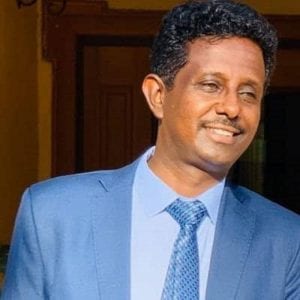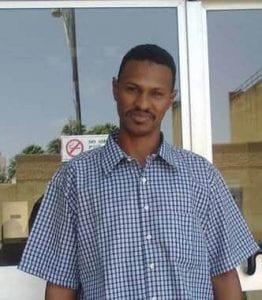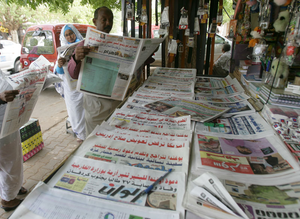Sudan’s two-faced approach to press freedom
Although slight in stature, her voice boomed her indignation towards the army’s on-going hold on power in Sudan. A social media clip captured the female high school student leading a protest chant on 30 June in Bahri, North Khartoum. The clip went viral in Sudan, receiving a multitude of praises via social media among the millions of Sudanese who participated in the protests that eventually toppled former president Omar al-Bashir last year. But other influential actors were not so supportive.
In early July, men who identified themselves as military officers began calling her and her family, threatening a lawsuit against her for “use of curses against the army.” On 18 July, the army said it would take legal action against any journalist or activist who “insult” the institution. “Our patience is at an end in the face of insults and accusations [aimed at] damaging the army and security system,” the statement read.
Journalists and civil society activists say there are better press conditions under the transitional government but fear the military and linked security forces will renege on these hard-earned freedoms. A litany of anti-press laws remains in Sudan’s books and recent events suggest the army are prepared to use them.
The army spokesperson cited the Cybercrimes Act in the statement – a 2007 law drafted by the former regime designed to silence critics through sweeping terminology targeting anyone who “spreads false news” or publishes “indecent material”. A 2018 amendment did not improve matters and even increased prison sentences for certain offences.

According to Hassan Birkiya, a member of the media rights organization, the Sudanese Journalists Network (SJN), the army’s citation of the Cybercrimes Act is a portent of Sudan’s closing space for media freedom. “There are many signs that show the security sector and the military are keen to impose more suppressive measures against the press,” Barkaya told Ayin .
The army also threatened to use the Newspaper Act and the Criminal Act in the statement, both past censorship tools used by the former ruling National Congress Party. Although Sudan’s constitution protects press freedom, authorities under the former regime used a number of subordinate laws to instigate legal proceedings against journalists. These laws are still active under the current government. In the past, human rights groups have called for amendments to anti-press laws including the National Security Forces Act of 2010 and the Press and Printed Materials Act of 2009.
The statement issued by the army seemed to unleash further threats by the security forces against the press, setting a potentially dangerous precedent for media freedom in the future.
The following day after the army released the statement, an army officer verbally threatened a journalist while both were participating in a TV talk show. Featured on Sudania 24 , journalist Adil Kolor from Al-Midan newspaper listed a series of publicized foreign attacks against Sudan, including the alleged 2012 Israeli bomb attack of the Yarmouk ammunition factory in southern Khartoum. In response, Maj Gen Amin Ismail accused Kolor of “terrorism” and warned him never to “reveal” military details again – despite the fact the details mentioned by Kolor were all in the public domain.The Major-General said an official complaint would be filed against Kolor for the “disclosure of military secrets”. Ismail’s reaction prompted the Sudan Journalists Network to issue a condemnation, stating that such threats “are no different from the targeting of journalists during the reign of Omar al-Bashir.”

On 19 July, the same day following the army’s statement, members of the paramilitary Rapid Support Force (RSF) detained a freelance journalist for filming near the Nile River in Khartoum. Freelance journalist Ali al-Dali had gone to take photographs of the Nile River in the al-Shagra area of Khartoum after reports emerged that the Nile water levels had significantly reduced. Al-Dali requested permission from local authorities to take pictures, he said, but the official called on the RSF militia to arrest him. The RSF detained al-Dali for roughly five hours and confiscated his press card and camera equipment despite the fact the RSF have no legal authority to arrest anyone.“It was an illegal arrest conducted by forces that have no right to arrest ordinary people – let alone journalists,” al-Dali said. While acknowledging that press freedom conditions have improved, the detention worries al-Dali.
The legal threats made by the military appear at loggerheads with the civilian side of the transitional government in Sudan. Last September, Prime Minister Abdullah Hamdok broke from the past by signing the Global Pledge to Defend Media Freedom and declared at the United Nations General Assembly that, “never again in the new Sudan will a journalist be repressed or jailed.” More recently, Information Minister Faisal Mohamed Saleh told the independent news site Al-Taghyeer that some government ministries were not performing well in terms of their media responsibilities and vowed to rectify the situation. Saleh told Al-Tagyeer they would improve the release of government information to the public by improving the media offices within the ministries and enacting a law punishing government institutions that refuse to provide journalists information.
Local journalists are enjoying certain freedoms never before experienced under Bashir. “There is generally a big improvement in press freedom in Sudan – Newspaper confiscations have been stopped and journalists are no longer summoned by security forces,” al-Dali said. But as long as the government remains Janus-faced in its approach to media freedoms, journalists may never know what can be reported on safely and self-censorship will take center stage once again. “I hope my incident was an isolated one,” al-Dali adds, “but if these cases continue to other journalists, then I can say there is back-stepping in (Sudan’s) freedom of the press.”


